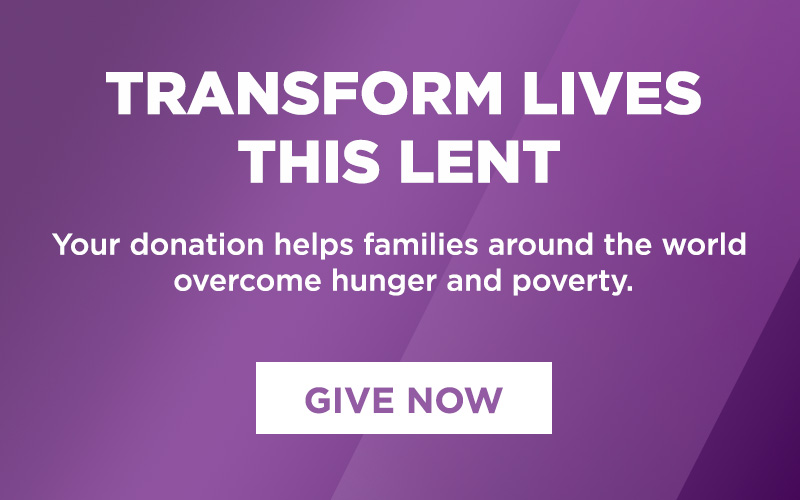“The next day he took out two silver coins and gave them to the innkeeper with the instruction, ‘Take care of him. If you spend more than what I have given you, I shall repay you on my way back.’”
—Luke 10:35
What is Almsgiving?
Our almsgiving has the power to transform the world. During Lent, CRS Rice Bowl invites you to reflect on some of the lives that are changed through Lenten almsgiving. Read stories of hope from around the world and reflect with your family using our Lenten family calendar.
We all want to be “good Samaritans.” When we see our sister or brother suffering, we are moved by compassion. We want to help. We are inspired to give.
Almsgiving is central to how we practice Lent. Almsgiving flows from prayer and fasting. We reflect on the needs of the world and how God is calling us to meet those needs through prayer. We make room for the needs of others—and for the Holy Spirit to work within us—through fasting. Through a recognition of the world’s needs and a personal commitment to act, we give alms.
What are alms? Alms are money or goods that are given to—or other acts of charity that are performed for—those in need. Catholics look to the Catechism, which says that almsgiving is “a witness to fraternal charity” and “a work of justice pleasing to God.”
Giving Alms for World Hunger
When we reflect on the charity of the good Samaritan, we sometimes miss the second part of the man’s almsgiving. He leaves the innkeeper with these words—and a few coins: “Take care of him. If you spend more than what I have given you, I shall repay you on my way back.” He gives freely and wholeheartedly in equal measure to the need of the one whom he serves. No reservations. No disclaimers.
This Lent, almsgiving is your way to become a “good Samaritan.” As we journey from Ash Wednesday through Holy Week to Easter, we invite you to consider CRS an innkeeper in your Lenten almsgiving.
How CRS Uses Alms
For 50 years, Lenten alms given through CRS Rice Bowl have supported programs that prevent hunger and poverty around the world, including the countries featured in the Lenten stories of hope. Seventy-five percent of gifts help support CRS’ work in more than 120 countries. Twenty-five percent of gifts remain in each U.S. diocese where they are given to support hunger and poverty alleviation efforts in those communities. Each diocese uses this differently. Contact your local diocese to find out how the 25% is used.



